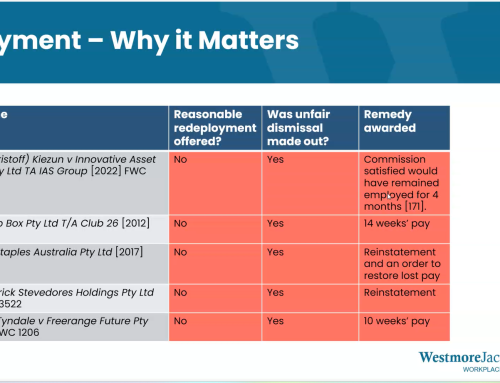Dismissing an employee because they are incapable of performing their job due to illness or injury is tough for all involved. From a legal perspective, there are many pitfalls, which if not carefully managed will expose an employer to liability. This includes successful claims of unfair dismissal, general protections or discrimination.
This article outlines some of the steps employers may wish to consider taking before deciding whether to dismiss an employee for incapacity. The focus of this article is on unfair dismissal.
Unfair Dismissal
An unfair dismissal is a dismissal which is harsh, unjust or unreasonable. When assessing whether a dismissal was harsh, unjust, or unreasonable, the Fair Work Commission (“the Commission”) will consider, amongst other things, whether there was a valid reason for the dismissal relating to the employee’s capacity or conduct.
When determining whether an employer had a valid reason relating to an employee’s capacity, the Commission will consider if the reason was “sound, defensible or well-founded”. “A reason which is capricious, fanciful, spiteful or prejudiced could never be a valid reason.”
An employee’s inability to perform the inherent requirements of their job is usually a sufficiently valid reason for their dismissal. However, leading evidence that convinces the Commission that an employee cannot perform the inherent requirements of their job is no easy task. In my experience, getting this evidence is where many employers come unstuck.
Below are a number of steps employers can consider as to improve the likelihood there is a valid reason for an employee’s dismissal.
Obtain a Medical Opinion on the Employee’s Capacity
Dismissals for capacity reasons differ from dismissals relating to conduct. When considering a dismissal for capacity, the Commission gives significant weight to medical opinions.
As a broad principle, a medical opinion which says, in effect, an employee is incapable of performing the inherent requirements of the job is often sufficient evidence that an employee cannot perform the inherent requirements of the job.
Conversely, the lack of a medical opinion advising that the employee is incapable of performing their inherent requirements will often lead to a finding by the Commission that the employer did not have a valid reason for the dismissal.
Employers are generally entitled to rely on expert medical assessments. However, in the case of conflicting medical opinions (for example, an employee’s doctor’s opinion conflicts with another medical opinion), the onus is on the employer to reconcile that difference of opinion. This could include having the employer’s doctor consider the employee’s doctor’s opinion, having the employee reassessed, and/or seeking an independent third medical opinion.
Make sure the Medical Opinion Relates to the Employee’s Capacity to Perform the Inherent Requirements of their Position
There is a distinction between a medical opinion regarding the employee’s condition, and a medical opinion regarding the employee’s capacity to perform the inherent requirements of the job. The Commission will generally favour the latter.
In Lion Dairy and Drinks Limited v Norman, the employer was faced with potentially conflicting medical opinions. The employer’s doctor was an Occupational Physician who gave an opinion on whether the employee was capable of performing the requirements of his job. The employee’s doctor gave an opinion on the employee’s condition and chance of recovery. On appeal, the Commission preferred the employer’s doctor’s opinion as it was the most “relevant and comprehensive medical advice”.
Likewise, in Duarte v The Paraplegic and Quadriplegic Association of NSW, the Commission preferred medical advice as to when (or whether) the employee will be able to return to their duties over medical advice detailing when the employee’s condition will begin to improve.
Getting Medical Opinion Too Early
The cases give little guidance on when a medical opinion should be sought. However, employers should be cautious of seeking a medical opinion too early, particularly when an employee’s condition or overall prognosis is likely to change in the near future.
When to obtain a medical opinion will depend on a number of factors, including the volatility of the employee’s condition. It’s best employers get advice about the timing of when to obtain a medical opinion.
Consider What, If Any, Reasonable Adjustments Could be Made to the Employee’s Position
In determining whether the employer had a valid reason for the dismissal, the Commission will often consider whether there was a “reasonable adjustment” which could be made to accommodate the employee’s incapacity. Importantly, the Commission considers adjustments which could be made to the employee’s substantive position, and not those which could be made to any subsequently modified position.
Employers should consider getting a medical opinion regarding what, if any, adjustments to the employee’s position could be made to allow that employee to perform the inherent requirements of their position. A failure to get this evidence may go against an employer in an unfair dismissal case.
Determine What Is, and Isn’t, an Inherent Requirement of the Employee’s Position
In short, inherent requirements are requirements which are, in fact, essential to the position. In determining this, the Commission will take a common-sense approach.
Employers should take care when advancing a position regarding what is an inherent requirement of an employee’s position. If an employer dismisses an employee because the employee cannot perform a non-inherent requirement, then the employer will be very vulnerable to a successful unfair dismissal claim.
Conclusion
Dismissing an employee because they cannot perform the inherent requirements of their position is fraught with legal risk. The above are just some of the legal considerations employers must take into account. There are many more.
Employers should seek advice before potentially dismissing an employee who is incapable of performing the inherent requirements of their job due to illness or injury.
This article is general information only. It is not legal advice. If you need legal advice, then please contact us.







Leave A Comment